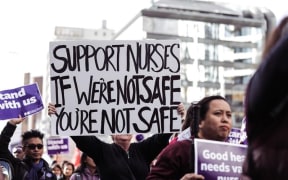Patients are at risk of harm as a shortage of nurses on Southern District Health Board wards forces some to ration their care.

All patients are exposed to risk when shifts are understaffed, the author of a review says. (file pic) Photo: 123RF
The problem was unearthed as part of a review into its agreed safe-staffing regime that will be discussed at a DHB meeting tomorrow.
Katie Simmons was on her fifth stay at Dunedin Hospital this year with her daughter who has underlying health issues.
She has been helping care for her daughter to ease the pressure on nursing staff.
"Sponging her down, just stripping her bed ... doing that because she's no weight bearing for six weeks. Getting her to and from the toilet where, you know, some parents ask the nurses for help, you know, just for those kinds of things."
Walking around the ward yesterday, Simmons said she never saw a nurse in the nursing station.
But she could not fault the staff who had provided great care while short staffed.
"You could just tell that they were so busy ... They were probably lucky if they were actually able to get a break. You know, you can see that tired look on their faces and they're doing their best and what are they supposed to do? It must be really hard for them."
The Southern DHB commissioned a review into its safe-staffing regime as part of its care capacity demand management programme.
It found one Dunedin Hospital ward was regularly understaffed by 20 percent or more during day shifts between July 2018 and October 2020.
The report's author, Jane Lawless, said all patients were exposed to risk when shifts were understaffed.
And shortages meant nurses had to decide which tasks would be sacrificed or prioritised, rationing their care.
"A person who needs assistance to mobilise may not get helped to do that during the shift. So the consequences don't seem very immediate.
"But that person may not make a full recovery because that was actually a really important thing to happen. It's things like the prompt attention to dealing with someone's noxious symptoms like their pain or their anxiety," Lawless said.
Often decisions on what gets prioritised were made in the moment.
Petrina Matthews and her daughter who had foot surgery ended up leaving Dunedin Hospital for their home in Invercargill a day earlier than expected.
"You could see that the nurses were flat out busy, there wasn't enough staff on," Matthews said.
"They sort of did the rounds. On Sunday, they said 'we think you can go home' and they discussed about being understaffed and they haven't got enough staff in the wards and it probably would be best if we went home that day ... which we ended up doing."
Staff-patient ratios may be needed - report author
Lawless said it could be soul-destroying for nurses who wanted to make a positive difference but couldn't provide the level of care they wanted to offer.
She commended the Southern DHB for commissioning the report and said it was far from being an outlier.
The report recommended the DHB focused on eliminating understaffing on shifts - which Lawless said might require a national mandated system like the nurse to patient ratios in Australia.
"There will always be more people needing care. There will always be more to do than we can do. But the point is, if we enter a patient into our health system, we have to be able to say that we're going to be able to provide what they require."
SDHB chief nursing and midwifery officer Jane Wilson said the report was commissioned following concerns it wasn't achieving its outcomes, despite significant investments in nursing and midwifery staffing over recent years.
The DHB - like many others - was working through meeting all the requirements of the programme and the findings were certainly not unique to the Southern DHB, she said.

The problems are not restricted to the Southern DHB, chief nursing and midwifery officer Jane Wilson says. Photo:
"A major issue is hiring of additional nursing and midwifery staff, which is proving problematic at Southern DHB and across the country due to nursing and midwifery shortages.
"This review was completed in collaboration with staff and unions and has been helpful in providing recommendations that will enable us to respond more effectively to workload pressures, particularly during a shift by having the right core base staffing and more effective variance response management for example, more flexible and responsive deployment of nursing staff to better match patient care needs."
In response to the report, and following recent work on the DHB's fulltime equivalent employees, Wilson said the DHB would be making a significant additional investment in nursing and midwifery staffing this financial year.
The report will be presented at a Southern DHB meeting tomorrow.






